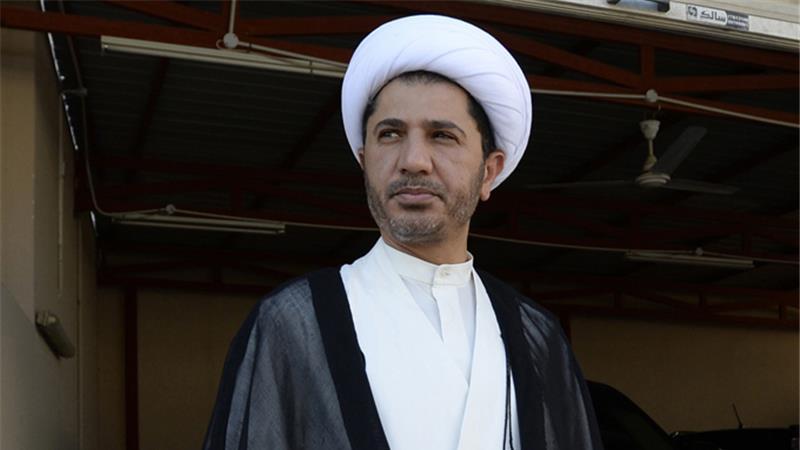28 December 2017 – Today, a Bahraini court again postponed until 4 January 2018 the trial of opposition leader Sheikh Ali Salman, Secretary-General of the now-dissolved Al-Wefaq National Islamic Society, on new charges of maintaining “intelligence contacts with Qatar.” Sheikh Salman is currently incarcerated on separate charges stemming solely from political speeches he delivered in 2014, and this new case could further extend his arbitrary prison term. Americans for Democracy & Human Rights in Bahrain (ADHRB) condemns the Bahraini government’s judicial campaign against peaceful political opposition and calls on the authorities to immediately drop these baseless charges against Sheikh Ali Salman.
On 12 November 2017, the Public Prosecution Office (PPO) officially referred the new case to the High Criminal Court, accusing Sheikh Salman – along with two other defendants who are not in custody, former Al-Wefaq MP Sheikh Hassan Ali Juma Sultan and Ali Mahdi Ali Al Aswad – of “establishing foreign intelligence links [with Qatar] to commit subversive acts against Bahrain and undermine its political, economic position and national interests with the purpose of overthrowing the regime” during the “2011 crisis.” Notably, Sheikh Salman’s first co-defendant, Sheikh Hassan, was publicly defamed in pro-government media over similar allegations in June 2017 and Bahraini authorities – including officials from the National Security Agency (NSA) – repeatedly detained and tortured his son, Mohamed Hasan Ali Mohamed Juma Sultan, in an attempt to coerce him into becoming an informant to help them target Sheikh Sultan and other political figures. The government arbitrarily stripped Sheikh Sultan of his citizenship in 2015, and he is no longer in the country.
As its “evidence” against the defendants, the PPO cites the “existence of direct communications via meetings between [Qatari officials and Al-Wefaq] inside Bahrain and abroad and the exchange of messages and telephone calls” monitored by the Bahraini authorities, and the appearance of Al-Wefaq members in well-known Qatari media outlets like Al Jazeera. However, as noted by the Bahrain Institute for Rights and Democracy (BIRD), Qatar’s attempted mediation between the government and the opposition groups was open and well-documented in 2011, including by the Bahrain Independent Commission of Inquiry (BICI). These bizarre allegations were not raised publicly by the Bahraini government in the intervening six years, against Al-Wefaq or Qatar, until the onset of the Saudi- and Emirati-led diplomatic row with the latter in June 2017. Sheikh Salman denies all charges against him.
Bahraini security forces initially arrested Sheikh Salman in December 2014, after he delivered a political speech. Following a complex series of appeals and retrials, the Court of Cassation ultimately sentenced him to four years in prison in April 2017, and he is currently serving his term in Jau Prison where he faces regular abuse and poor living conditions. As early as September 2015, the United Nations (UN) Working Group on Arbitrary Detention (WGAD) determined that Sheikh Salman was being held arbitrarily and recommended his immediate release with an enforceable right to compensation.
In 2016, with Sheikh Salman incarcerated, the government moved to forcibly dissolve his political society, Al-Wefaq. On 17 July 2016, the High Civil Court affirmed a Ministry of Justice order to close Al-Wefaq, after the authorities had seized the group’s assets, blocked its website, and shuttered its headquarters. The government has taken similar action against nearly all opposition groups, including Wa’ad, the largest secular leftist society, which was dissolved in 2017.
“With new elections for Bahrain’s lower house of parliament – already a hamstrung institution – set for 2018, the government is clearly exploiting the diplomatic crisis with Qatar to further suppress peaceful dissent and cement its control of the political process,” said Husain Abdulla, ADHRB’s Executive Director. “Sheikh Ali Salman is already arbitrarily detained for raising his voice, and Al-Wefaq was already forcibly dissolved, but the government is insisting on taking even more transparent reprisal measures against the peaceful opposition group. This trial is a cruel joke and it should be ended at once.”
The Bahraini government has violated Sheikh Ali Salman’s rights to liberty, fair trial, free expression, and free association as defined in articles 2, 9, 10 11, 18, 19, 20 and 21 of the Universal Declaration of Human Rights (UDHR) and articles 9, 14, 18, 19, 21, 22, 25, and 26 of the ICCPR. The authorities must immediately release Sheikh Ali Salman, as well as all other prisoners of conscience, and reinstate all arbitrarily dissolved political societies, like Al-Wefaq and Wa’ad. ADHRB additionally calls on the United States and Bahrain’s other key allies to pressure for an end to the Bahraini government’s gross and systematic violations of the right to free expression, assembly, and association.
For more information on the case, see ADHRB’s original statement here.





